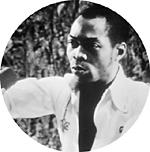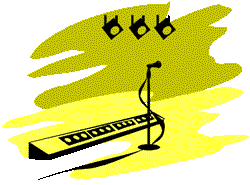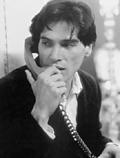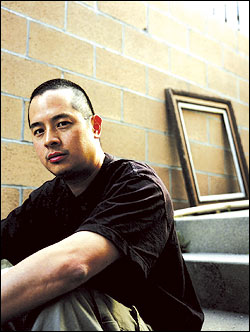There’s so much good music from around the globe available right now that it seems somewhat criminal to focus solely on one continent’s past output in the name of “world music.” But when that continent is Africa, it’s easy to be forgiving—particularly given the generous amount of excellent, previously hard-to-find older music that’s surfaced in the past couple of years.
Take, for instance, the work of Nigeria’s Fela Anikulapo-Kuti, who died two years ago of AIDS-related illness. Fela remains the best-known African musician in the West, but for years his mammoth, often inspired catalog was only available in frustratingly small pieces. This year, France’s Barclay label remedied this, beginning a reissue campaign that has yielded 10 single CDs containing two albums per CD and a self-explanatory double-disc compilation titled Two Sides of Fela—Jazz and Dance, with more to come. Taken together, this is the most essential funk motherlode to be dropped all at once since Polydor released the James Brown four-disc box set Star Time in 1991; the only drawback is that the discs are available only as imports. MCA is putting together a two-disc Fela compilation for early 2000, but almost without exception, the albums collected on Barclay’s beautiful packages are worth owning in their own right.
Beginners should start with the incendiary Confusion/Gentlemen, two mid-’70s albums that capture Fela at both his most radical and archetypical: fierce, dreamlike music that sounds like Miles Davis or Sun Ra’s electric bands playing the James Brown catalog. Then try Original Sufferhead/I.T.T., from the early ’80s, which sharpens Fela’s trademark political lyrics (“I.T.T.” is a rant against the multinational of the same name—Fela calls it “International Thief Thief”) to a fine point. The rest of the Barclay titles—Coffin for Head of State/Unknown Soldier; Expensive Shit/He Miss Road; Opposite People/Sorrow Tears and Blood; Shakara/Fela’s London Scene; Shuffering and Shmiling/No Agreement; Stalemate/Fear Not for Man; V.I.P./Authority Stealing; and Yellow Fever/Na Poi—can follow in just about any order. (Each single disc is about $21 retail; Dusty Groove America—www.dustygroove.com—sells them for about $16 apiece, plus shipping. Two Sides of Fela is about $30 retail, or $24 plus shipping from Dusty Groove.)
As beloved a figure as Fela was, however, his charisma and influence were outstripped by Congolese/Zairean guitarist, singer, and bandleader Luambo Franco and his band O.K. Jazz, which may well be 20th-century Africa’s most popular group. Franco is also the century’s most important African musician, essentially inventing modern Afropop guitar on a series of sublime early ’50s sides that laid the blueprint for soukous, the region’s leading pop style. (He retained his popularity for nearly 50 years before succumbing to AIDS-related disease in 1989.) Franco’s highly lyrical style—which borrowed heavily from the African-descended Cuban dance rhythms sweeping West Africa during the early 1950s—meshed rhythmic finesse and melodic invention into a propulsive whole, and his mark can still be felt in the playing of modern soukous guitar giants Rigo Star and Diblo Dibala. His discography is somewhat unwieldy, though, even for fans: some 200 albums recorded during his lifetime, much of it out of print and even more only available on indifferent packages.
So begin at the beginning, with RetroAfric’s exquisite Originalite (about $17), which contains O.K. Jazz’s first 20 sides; recently remastered and reissued (a shorter version appeared in the late ’80s), this is Afropop’s Sun Sessions. If you want to know where Franco went, the most easily accessible place to begin is Omona Wapi (Shanachie, about $17), a mid-’80s recording made with longtime Congolese rival Tabu Ley Rochereau; marked by effortless rhythmic flow and casually gorgeous singing, it’s one of the best duet albums ever made, by anybody in any category. After that, you should start saving for the career-spanning four-CD box set Stern’s Africa is planning for early 2000. If you can’t wait that long, hear how Franco’s innovations were advanced upon in turn by getting your hands on Zaiko Langa Langa‘s raw, scalding Zaire-Ghana 1976 (RetroAfric, about $17). Zaiko began as a group of high school students who were as influenced by Otis Redding and the Rolling Stones as they were by Franco or Rochereau; the group used as many as five drummers in addition to the two or three guitarists on hand at any given time. Zaire-Ghana is exciting as hell, solid from beginning to end, and contains their greatest hit, the outrageously catchy “Zaiko Wa Wa.”
Ghana was the home of the great trumpeter, singer, and bandleader E.T. Mensah, who was as important to his genre—highlife—as Franco or Zaiko were to theirs. Actually, “genre” is unfair—as RetroAfric’s superb pair of compilations, Day by Day (1991) and All for You (originally released in 1990, and remastered and extended for its 1998 reissue; both about $17) prove, Mensah was as adept at calypso (Beach Boys lovers will want to listen for All for You‘s “John B Calypso”) and samba as he was at highlife. Not that you’ll necessarily notice the difference—or care, since the frisky ’50s and early ’60s sides cut by Mensah and his band, the Tempos, still sparkle with wit, snap, and unhurried vigor.
Ghanian highlife owed a good-sized debt to American jazz, but the music wasn’t venerated there quite the way it was in South Africa, where zoot suits and big roadsters were considered status symbols. Over and above style fetishism, Johannesburg’s swing bands made their fandom signify by turning out records every bit as exquisite as anything being made in Kansas City or New York. You can find some of the best examples on the fine soundtrack to the movie Mandela (Uni/Polygram; about $17), where the gorgeous harmonies of the Skylarks and the supple swing of the Manhattan Brothers brush up against the more modern sounds of Brenda Fassie and the Specials. But the best way to go here is Music Club’s perfect Township Jazz ‘n’ Jive (about $12), 18 cuts spanning 1939-1963 whose breathless beauty leaves the listener a bit dazed.
In contrast, Township Jazz‘s sequel, Freedom Blues (Music Club, about $12), is a wake-up call. This is where Jo’burg’s jazz players, following their American influences, start getting militant, and with good reason: Nearly everything on Freedom Blues was recorded during apartheid. The musicians collected here—most famously Adullah Ibrahim and Hugh Masekela—started toughening their sound, ࠬa post-boppers Monk, Coltrane, Blakey, Mingus, and Rollins, and the collection damn near matches its obvious influences in terms of chops, expression, and sheer groove power.
By contrast, the contemporaneous mbaqanga sides collected on The Kings & Queens of Township Jive (Earthworks; about $17) constitute one of the best party records ever assembled: sax-led instrumentals like Thomas Phales‘ “Platform 14” and West Nkosi‘s “Chillis 500” (featuring one of the best wah-wah guitar parts ever recorded). These’ll raise the roof of any building you play them in. But even if Kings & Queens isn’t outwardly rebellious, it shares an indefatigable spirit with Freedom Blues—and with just about every other record mentioned here.
Michaelangelo Matos writes about music for Seattle Weekly.








